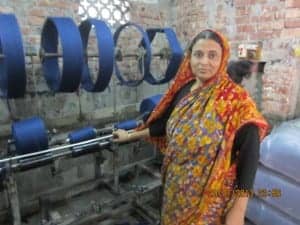
Monowara and her husband live in a small dwelling just outside Dhaka with their children. While happy, their finances were tough. She and her husband were unable to support their family on her husband’s meager income. She wanted to earn money for her family, but she had no education, skill, or money to do any business. She started by engaging herself as a worker in a garment factory near her house, but she was not satisfied with this kind of work and wanted to do something independently. During her time at the factory, she learned the technique of knitting sweaters, and became interested in the idea of creating a business, but had no money. One day, a neighbor suggested that she go to the Shakti Foundation. And so she did. Monowara went to the branch the next day spoke with the loan officials there and soon became member.
Shakti Foundation gave her loan of taka 5,000 to start her business. She purchased supplies with the first loan and sold her goods in different areas. As more and more people learned about her products, she sought additional capital support from Shakti Foundation to create her factory. Around this time, she also began exploring what her customers wanted and searching for new designs to expand her business. Shakti also supported her through this business growth through practical business training offered through the institution.
Not long after setting up her small factory, Monowara started to employ workers, including her husband and son, to increase production and to meet the demand for her goods. She took a bigger loan to expand her business and presently, there are 35 individuals under her employ. She has multiple points of distribution: a showcase store where larger retailers buy the goods and contacts in many other districts in Bangladesh who sell her goods. Her monthly income is now taka 50,000, a far cry from their meager income of a few years ago. Her business and success has enabled her to have bigger dreams as well: her vision is to set up a big factory and create more job opportunities for poor people, especially for poor women.
“In the beginning I had to work a lot; I worked from morning till late night,” sighed Monowara. “However, now I have already established my position in the market, I can earn enough money. I can spend spare time with my children and husband, which gives me satisfaction that I’m a good mother and wife, besides an entrepreneur.” Her success has empowered her position within the family as well: “Now, my husband always seeks my suggestions on important family matters. I think as a woman I get due respect from my husband.”
Monowara is grateful for the support that Shakti gave her, not just the loan and business management training, but also health and gender related awareness training, many suggestions on how to improve my business and endless encouragement from staff. Shakti has played such an immense role in her life that she sees its impact in her everyday life. She says, “Shakti is my strength, I feel that women who earn livelihood get respect in our society; therefore every woman should work according to the skill she has.” Despite only going into work to be able to support her family’s financial needs, now Monowara enjoys working. When asked why, she exclaims “because I am an independent now!”



